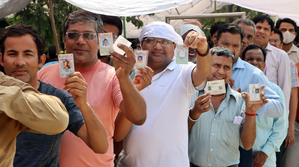India’s electoral process one of the most trusted in world: Report
By IANS | Updated: August 14, 2025 20:55 IST2025-08-14T20:45:46+5:302025-08-14T20:55:14+5:30
Dubai, Aug 14 India's general elections and the electoral process , often referred to as the largest democratic ...

India’s electoral process one of the most trusted in world: Report
Dubai, Aug 14 India's general elections and the electoral process , often referred to as the largest democratic exercise on the planet, remains "one of the most trusted in the world" cited a report published in a leading English daily of the United Arab Emirates (UAE) on Thursday. However, the term, it said, hardly does justice to the scale considering that approximately 980 million people were eligible to vote during the Lok Sabha elections held in 2024.
The elections were conducted across a record one million-plus polling stations, guarded and staffed by over 15 million officials and staff, the Khaleej Times said in a report. The nationwide election process is conducted every five years with almost clockwork precision.
"The institution at the heart of this mammoth operation is the Election Commission of India (ECI), an autonomous constitutional body that has earned international respect for its independence and efficiency. Established in 1950, it operates with a mandate enshrined in the Constitution, immune from political interference, and guided by a clear code of conduct," the report highlighted.
It further stated: "Its credibility rests on a relentless commitment to fairness - from monitoring campaign finance to enforcing the Model Code of Conduct that governs political behaviour, the ECI’s authority is both legal and moral. Working ceaselessly without fear or favour, it has a culture of accountability that has made India’s electoral process one of the most trusted in the world."
India was the first nation to use mass electronic voting for the first time in the world way back in 1982. In the report, Former Chief Election Commissioner TS Krishnamurthy, under whose tenure EVMs were used extensively, stated, "EVMs are a matter of pride for India as they cannot lie, and I have no doubts about the credibility of the machines."
Critics of technology in elections often highlight its vulnerabilities, Khaleej Times said in its report. However, India's use of technology has strengthened trust. Since 2004, India has used Electronic Voting Machines (EVMs) across the nation, replacing the paper ballots that faced delays and manipulation. Voter Verifiable Paper Audit Trail (VVPAT) systems were introduced enabling each voter to confirm their choice on a printed slip before it drops into a sealed box for possible cross-verification.
Biometric voter ID systems, GPS tracking of poll parties, and live webcasting from sensitive booths were conducted to form a multilayered defence against fraud. Observers from the Commonwealth to the United Nations have praised India’s ability to blend scale with security, even as they lauded the election process for its transparency, peacefulness, inclusiveness, and accessibility.
The most important feature of polls in India is their inclusivity, the report stated. The Election Commission of India ensures 100 per cent accessibility, creating polling stations in mountain hamlets, desert villages, and islands in the Sundarbans. Voters with disabilities, senior citizens, and those residing in remote conflict areas receive special facilities by ECI so that they can participate in the electoral process.
"For countries seeking to strengthen democratic institutions, the Indian example offers a simple yet profound lesson: integrity is not an accident; it is the product of vigilance, inclusivity, and a culture that places the voter - every voter - at the centre," the report detailed.
Disclaimer: This post has been auto-published from an agency feed without any modifications to the text and has not been reviewed by an editor
Open in app